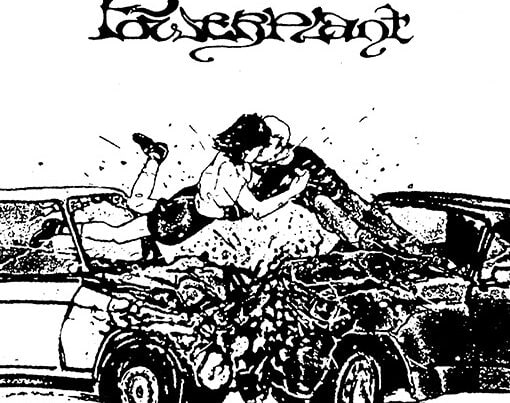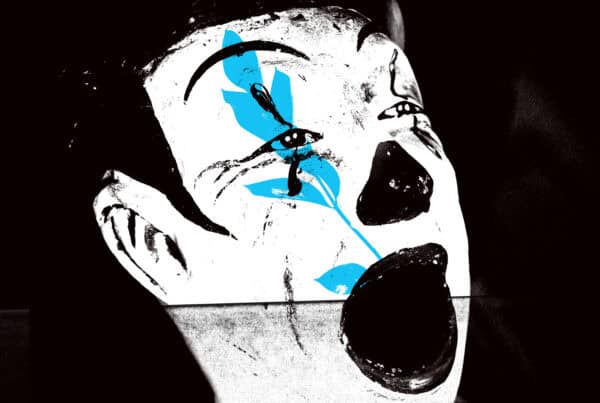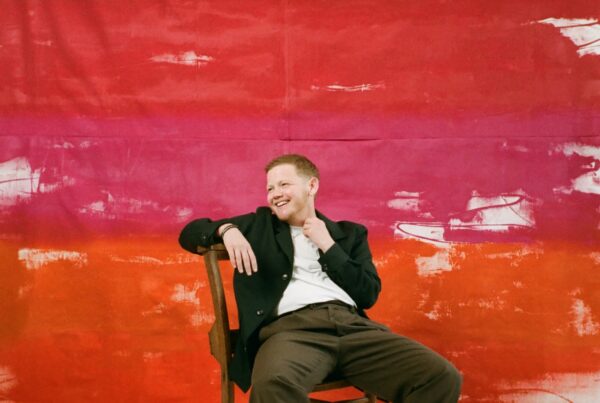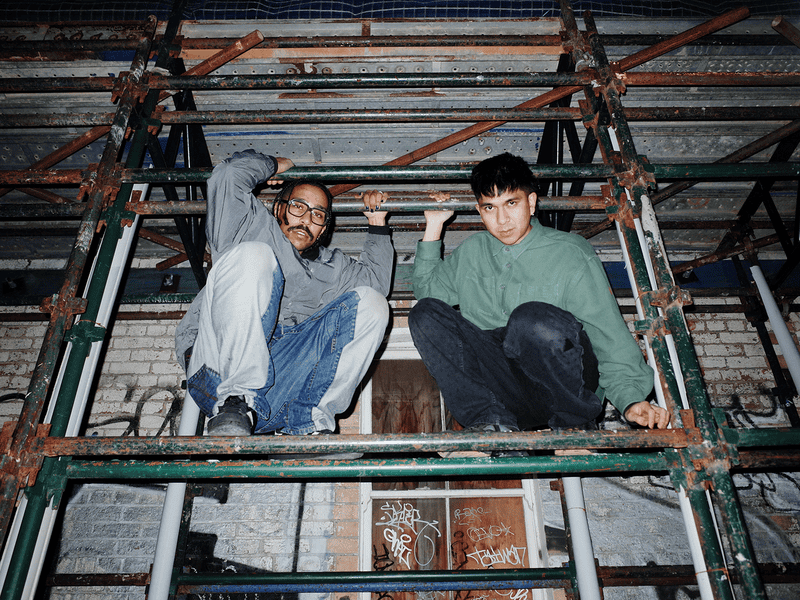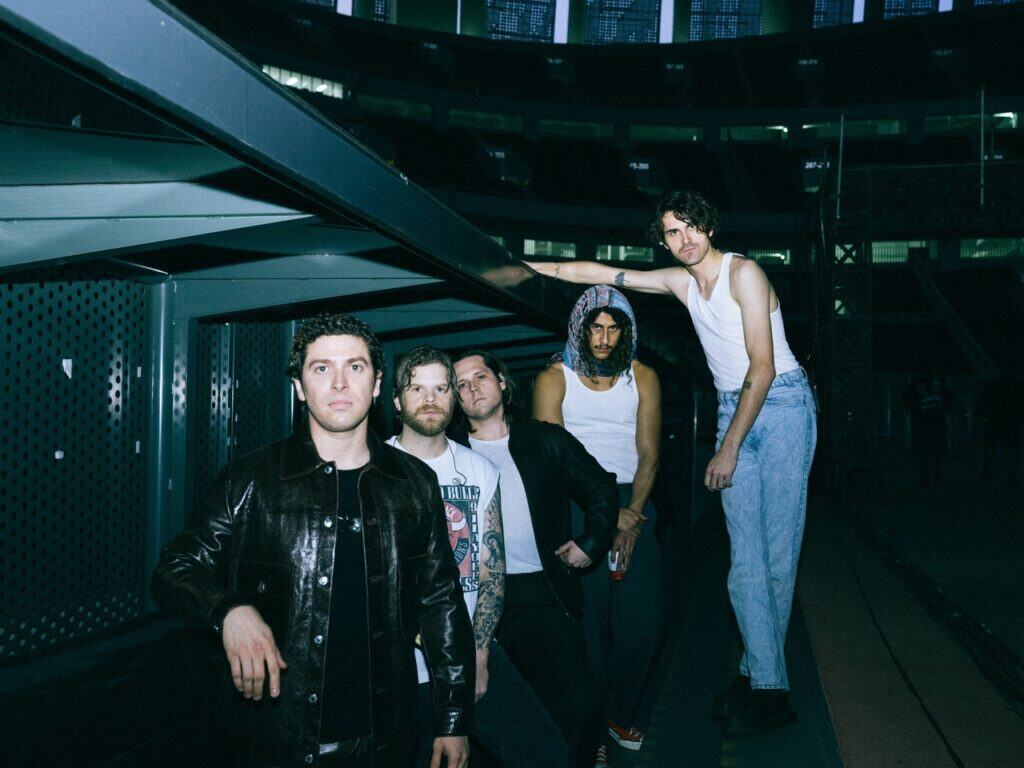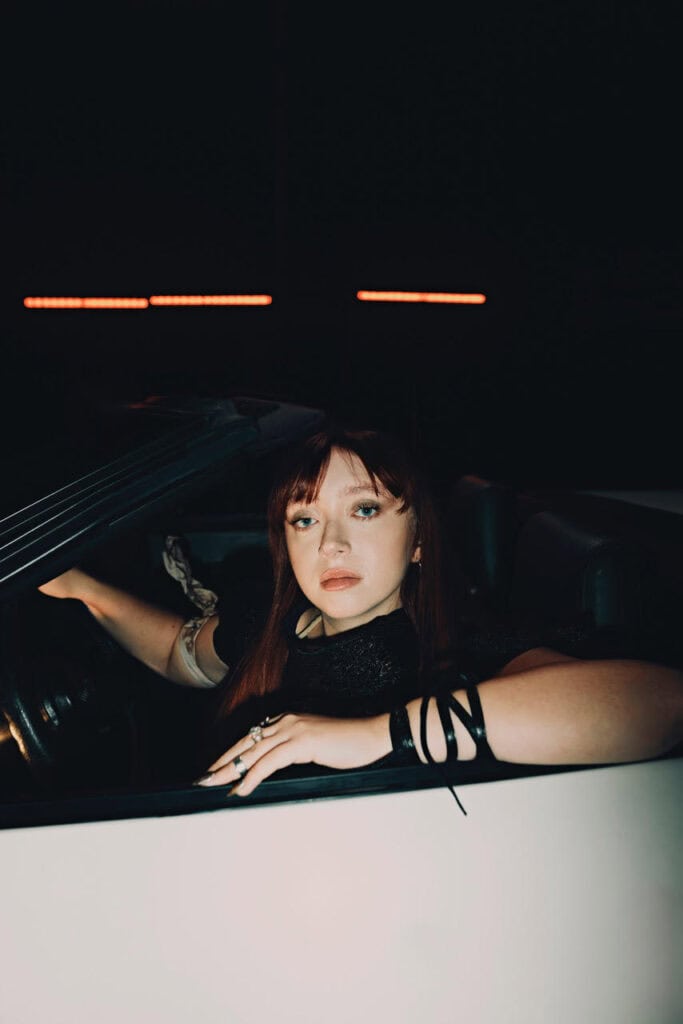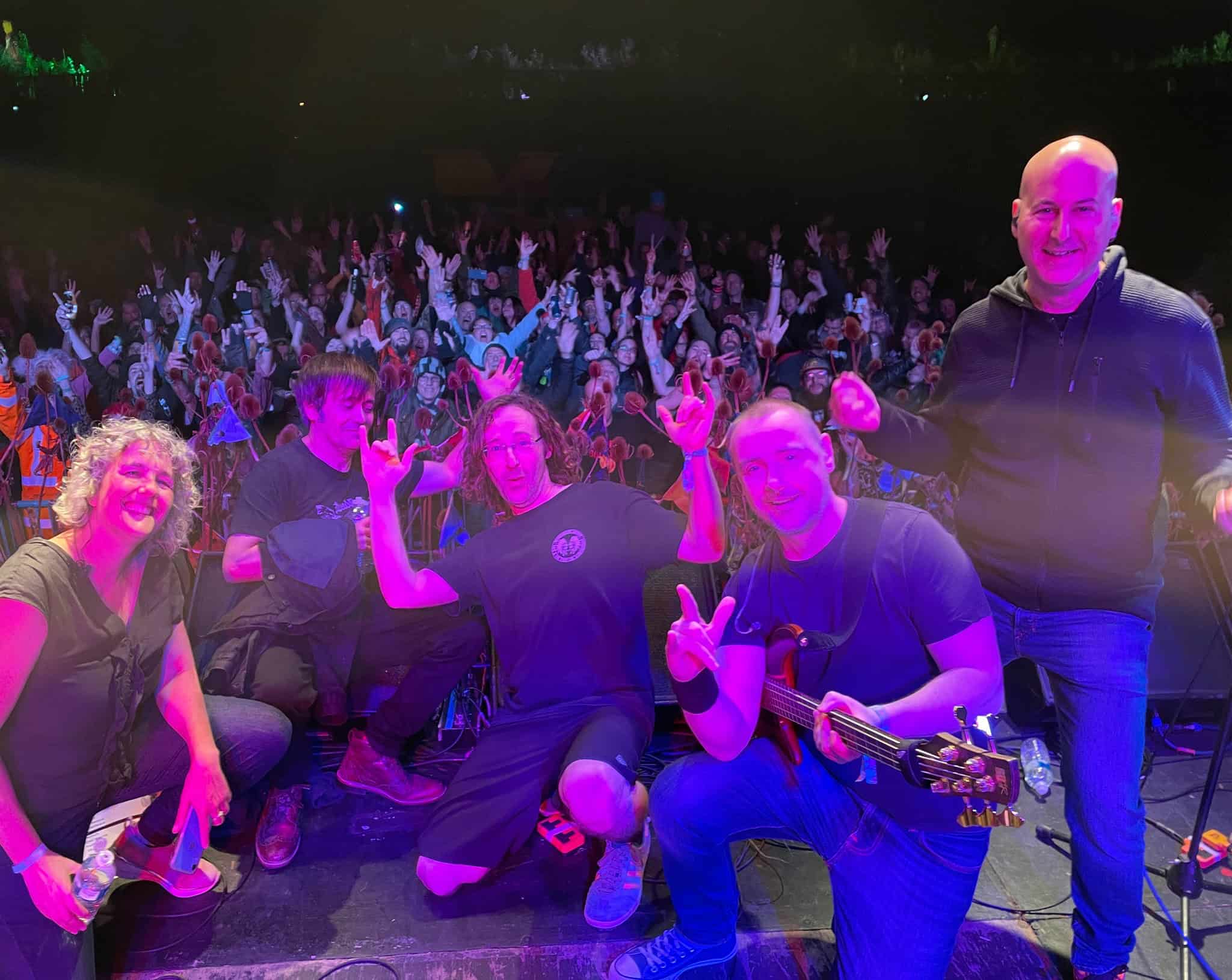
Senser formed in 1989 in South West London
Senser is, in my opinion, the best rap-rock group out there, but in truth, they’re so much more than just a rap-rock band. Their blend of gnarly guitars, psychedelic keyboards, thumping hip-hop beats, and biting, political lyrics made for a bold and unique sound, ending up something like a cross between Rage Against the Machine and Massive Attack. Not to mention the consistency of their catalogue with albums like ‘Schematic’ and ‘How To Do Battle’ is very impressive, especially when compared to their contemporaries and sound-alikes. Now though, three decades on from their seminal debut, it seems the group are prepping for a comeback. So, I sat down with vocalists Heitham Al-Sayed and Kerstin Haigh to reflect on the impact of the LP, as well as gather some insight on what’s to come.
So ‘Stacked Up’ turned 30 recently. It must feel surreal for you all having something that you did 30 years ago still be beloved and regarded by some as a classic album of the 90s?
Kerstin Haigh: Yeah, and I think it’s also quite relevant to what’s going on in the world today. It feels like we’ve gone a full circle and landed back in the same place with the issues of the world.
Heitham Al-Sayed: I think one of the things about it is that we sort of dug quite deeply and were trying to be very honest at the time about lots of different issues and ideas. That undercurrent has never really left. Some of the ideas, struggles, and the political positions in there have stayed relevant ever since. So a lot of the things we were talking about then have just gradually unfolded to the point where they’re almost commonplace.
KH: They’re worse if anything. To some extent they seem to have developed into a bigger beast.
HA-S: We’re lucky because a few years before that, certainly the things that I was writing sounded very much like sixth form poetry. It just wasn’t of that quality, but by the time that record came out, the things we were writing… I feel lucky that what I wrote then was of a certain quality, and that it still stands up, because if it had been a couple of years earlier, it wouldn’t be the case. It wouldn’t have had that kind of success in the first place.
I wondered about the songwriting process, both back then and indeed now. Was it quite collaborating between everybody? Or was it like one person would bring a lyric or riff in and then the rest of you would build around it?
KH: It was a kind of mixture really. People would bring in different elements at different times. Sometimes they’d then come together as a collaboration. It’s always been a bit like that, though. Often Heitham has raps and stuff that are developing outside and then grow into the songs. Same with Nick with the guitar riffs. They just come together, and somehow we bring all these elements together and create something that is a big collaboration.
HA-S: There’s a change, definitely. In the past, you would make notes of your ideas, make a little recording if you had an idea, and then bring it into a rehearsal space, and go through it for hours and hours. Sometimes we would do hours of jamming, to just see what came out. It wasn’t particularly productive, because people were hoping that ideas were going to magically come out, whereas you can have an idea at any time, and it’s much better to bring ideas and to jam on something that you already have than to just hope that it magically arrives.
Now everybody can write in their own space. They can send it to you, people can get together in twos and threes, you can record in groups. I record and make demos a lot with James and Nick, and I do some recording here in France. So you can do so much more now. It’s so much easier to make music if you if that’s what you want to do.
KH: I do slightly miss the element of the whole band. Because we’re sort of plastered across different parts of Europe and the UK, I do sometimes wish that there was a little bit more of where we could just be in a room together here and there. ‘Stacked Up’ benefited from that I think. What we’re doing now is going to be a different entity and it I think it’ll be great. We’re in the middle of this album, we’re hopefully going to release it in the next few months, and I think it’s an interesting album. It’s going to deliver something that’s different from what we did in the past, I like both ways of working. I think both ways have their benefits for sure.
I wondered whether there was any sense within your guys’ camp at the time making ‘Stacked Up’ where you went “we’re on to something new here sonically.”
HA-S: Personally, I think so because we were actively trying to make something new sonically, and we wouldn’t quite settle until we’d done it. So, yes, we were trying to push together things that hadn’t sat together before and trying to invent new ways for that to happen. There were a couple of times where we knew, like, “Oh yeah, this is this is gonna really work.”
KH: There were a lot of conversations in the early days where we were listening to rap music, and I was listening to things like Sheila Chandra and music from across the world, and folk music. Nick was listening to metal. Everyone had different elements that they were bringing into this space together, and we had the conversations like “why don’t we bring them together? Why don’t we make these things sit in the same place?” What ‘Stacked Up’ became resulted from that kind of communication.
The second album, ‘Asylum’, I find quite interesting in that Kirsten very much took the lead, and a couple of members [Heitham, producer Haggis, and drummer John Morgan] left to go start Lodestar at the time. I still think it’s a great record, but I wondered whether you look at it fondly now, or whether it seems a weird blip in retrospect?
KH: It’s a departure from the band as we were for sure, and we had a different drummer with different influences. He was bringing in a lot more Drum and Bass sounds. We were bringing in gabber as well. There were quite a lot of other influences coming in there, which were interesting. I enjoyed the process. There are a couple of songs there I don’t like, but I’d say most of them I find interesting, and I’m proud of what we did. It was showing the other journey that Senser was on. Really these are like parts of our story.
HA-S: I think it was a really exciting record. If it’s not the same people in the band, then it’s not going to be the same, but it was just a super exciting record, and I’m really disappointed that we don’t play enough of it. It’s just a waste. It’s a really, really good record. It’s really interesting. I think it was exactly the right thing to do, to try and, move it into something that wasn’t completely different, but different enough for people not to compare it in a way. Yeah. It’s a really good record. It’s got some great stuff on it.
KH: It’s definitely a departure from ‘Stacked Up’, but it’s… I think for all people when they’re into a band, there are so many fluctuations in the band members’ lives, you’re never gonna have the same thing from the beginning to the end. It’s just never gonna be the same thing. I think being a part of that journey as a fan is also valuable. I think very often a fan can get something out of that, because it’s part of the bigger story.
I’ve been listening through your discography recently, and it seems like the records themselves… they all have that cohesive “Senser sound” to them, but they are all different. ‘Asylum’ is more electronic, ‘Schematic’ is maybe a bit more industrial, ‘To the Capsules’ was maybe slightly grander. I wondered whether it was a conscious thing where with each record you guys try to switch up the approach.
HA-S: I think it’s there’s a conscious amount of that that happens, but also, like Kerstin’s saying, there’s the fact of the passage of time, and the fact that your writing is going to change naturally. There’s a conscious part of saying, “we want to do something more stripped down, or we wanna do something richer or whatever. Part of it is conscious, but a part of it is just the way that people’s songwriting is gonna evolve as they go along. I’d say about 20% is conscious and the rest of it is “we’re just going to write the stuff that we want, and then see how it fits.”
KH: Sometimes it just comes in like feelings do. Sometimes you’re feeling something, and you’re not in control of that all the time. So it’s a bit like how you feel from day-to-day. Sometimes you want to do things really consciously, and some things are just like, “shit, I feel like this.”
Over lockdown, you guys did a cover of The Who’s ‘Baba O’Riley.’ Was it a particular reverence of that track that made you pick it specifically, or was it something else?
HA-S: Well, we all love that song. I can’t remember the exact process, the way the original electronic sounds were made on that. I think it’s using some like layering of synthesisers onto a multi-track. It has that early electronics and rock fusion. The lyrics are kind of mysterious. You don’t quite know what he’s talking about. Some people have said he’s talking about the Vietnam War. It just has this kind of slightly mysterious quality to it.
KH: It’s quite London-British, isn’t it? It’s quite a London-British song. It’s got quite a strong feeling of somebody who you know is… I think he [Pete Townsend] was a plumber or a workman before he became a musician.
HA-S: He’s a geezer from Shepherd’s Bush [laughs]. It’s a magic song. The melodies are incredible, nice vocal ideas, it splits up nicely between two people. It was just something that we love. We love The Who. I love early Who, ‘A Quick One While He’s Away’ I like. I just like tons of it. They were such an incredible band, and really innovative, almost an art band at one point with ‘Meaty, Beaty, Big and Bouncy.’ Very conceptual ideas. I love that band, so yeah, I’m not gonna say no to doing a cover.
We’ve done tons of hip hop covers. We did a whole EP [2011‘s ‘Biting Rhymes’] of the classic hip hop stuff that we loved: LL Cool J, Eric B & Rakim, Beastie Boys, Public Enemy. We’ve done some other strange covers as well. We did David Byrne and Brian Eno, we did a Butthole Surfers cover a couple of years ago actually [laughs], but that was just a live thing.
Speaking of, playing live is a huge part of what you do, and you’ve just come off some good dates supporting Dog Eat Dog around Europe. Is playing live something that you guys thrive on, or are you guys more of a studio band? I presume the live show is where it flourishes?
KH: I think playing live is really at the centre of it. Unfortunately, we’re not actually doing loads and loads of gigs, but I think it’s certainly where we started. The band was always gigging. We were gigging a lot even before the album [Stacked Up] was released, so that’s what we’ve forged ourselves on I suppose. Both things are important, but I think playing live is very valuable to what we do.
HA-S: Yeah, it’s always been a really exciting show, a really high energy gig. Because it’s got all these different elements to it: heavy crunching guitars and strange psychedelic keyboards and decks, we’ve been able to play in lots of different environments apart from our own actual gigs. We’ve been sort of accepted into a lot of different, quite secular communities, some of the very trippy, hippie type places, and some of the very heavy metal kind of crowds. Wherever we go, I’m always like, “is it going to be right for this sort of environment?” It’s great. It’s a pretty powerful live prospect.
You guys, like you say, you mix a lot of things. There’s hip hop, there’s metal, there’s psychedelia in there, trip hop. I’ve seen that rap-rock, rap-metal and nu-metal, I know you guys don’t like to be boxed in with that term, but that sort of stuff has had a bit of a renaissance recently. So, I wondered if you’d seen any influx of new blood coming to the shows, and whether that energises you guys seeing new people coming in?
KH: I have noticed there does seem to be a few youngsters in the audience here and there. Obviously, we’ve got our core fan base who turn up and… they’re not young [laughs], but there are some others coming through. I think maybe kids of the guys that that have been with us all that time, and maybe beyond, I don’t know. It seems like there’s a little bit more of that going on.
HA-S: Yeah, maybe a little bit, but there’s not much crossover [with nu-metal] really. Our music is very different in its content, in a way the content is more like sort of, what they used to call “britcore”, hip-hop like Hijack and Gunshot and all that sort of stuff. It doesn’t have much in common with the American rap-metal stuff, because most of that’s much more about the form than the content. The people that are into that are into it in more good time sort of a way, but there will be some crossover, and there’s some people who like that music in our audience. I wouldn’t overestimate the kind of effect of that. I think it’s always been a bit separate to that really.
There were a few bands back in the day that had strong political content, not in that rap metal sort of late 90s, early 2000s wave really. It depends on what you’re talking about.
I guess I was thinking of Korn and Rage Against the Machine, and-
HA-S: OK, Rage Against the Machine is an exception because they were very articulate. Zach [De La Rocha] has got an impeccable understanding of politics, left-wing action, and anarchist action. He knows what he’s talking about, and it comes through wholeheartedly. You can enjoy it on a surface level, but if you listen to what that guy’s saying, it’s incredibly well rooted in a genuine knowledge of politics, world affairs, and alternative systems of action and government, all this kind of stuff. Whereas Korn, you just can’t put them together, they’re not comparable. Rage Against the machine is our generation of people. When they do covers, they do covers of Afrika Bambaataa and Public Enemy. That’s where they’re coming from. Something like Korn or Limp Bizkit, it’s cool, there’s some great riffs, but that’s about it for me.
I would say that you guys have a much more British approach to like the way that you meld sounds and write lyrics.
HA-S: Definitely. There’s a kind of English-y, thrash sound in the way that Nick plays the guitar. There are specific elements where you can sort of guess where these things are coming from, but it’s quite subtle.
In the years since ‘To the Capsules’ came out, there’s been a lot of stuff going on for you guys, like Heitham, you came out with the new Lodestar record recently.
HA-S: Yeah, since that there’s been Lodestar, but I’ve also done three albums with my band Fiend in France, and there’s been a few collaborations and bits and pieces I’ve done. Why?
Well, there’s talk of a new Senser album on the horizon, which is very exciting. What could you tell us about it? I know there’ve been some new tunes thrown into the set, but is there any more you could tell us about the record? Like the headspace you were going into it with?
KH: It’s a funny thing, because we did a lot of the album in lockdown, which is obviously a kind of crazy experience, to be stuck in your home and thinking about things from a different perspective. It’s very hard to sort of give you an overview without playing you it, but I think it’s going to be really interesting, and people are gonna get something different out of it than all the previous ones.
The roles are slightly metamorphosising. I’m doing a little bit more rapping than I have previously, Heitham’s doing a lot more singing, so, that’s coming into it. Also the space in it is different. There are many elements in it that I suppose slightly reflect on our previous stuff, but it also sounds very new.
HA-S: Each thing’s very different. There are things that are quite short and concise, lean, and kind of stripped back. We’ve got a new DJ, Deckwrecka. He’s amazing. He’s an incredible musician, he’s doing a great job on this record. It’s quite varied. Because there are so many possibilities in Senser, and so many different directions that the music can go in within the sort of core thread of Senser, things will just evolve within those patterns and cross pollinate with each other. It’s just that natural evolution. Sometimes it’s leaner, sometimes airier and more spacey, but it seems natural.
KH: Then sometimes it’s a lot harder as well, like with ‘Get Crunked’, it’s a power-driven song. It’s concise, it’s heavy.
HA-S: Yeah, it’s very lean. There’s not a ton of different things going on.
I’m poking a little bit, is it an October/November release you’re looking at? I know you said on Facebook it was about 80% mixed.
KH: I’m hopeful we can get it out before the end of the year for sure, but I don’t know.
HA-S: I don’t want to put a date on it because if it doesn’t happen people might be disappointed. Only once we release the date, that’s when we’ll know. It’s unfair to say anything before it’s real. There’s no point in building anything up until it’s confirmed.
Fair enough. Any parting words?
HA-S: Free Palestine.
Senser’s upcoming 6th album is projected to release later this year. To keep up to date with the band, you can follow their Facebook page. Heitham’s band Lodestar just released their new album ‘ZONEN’. you can stream/buy it here.

